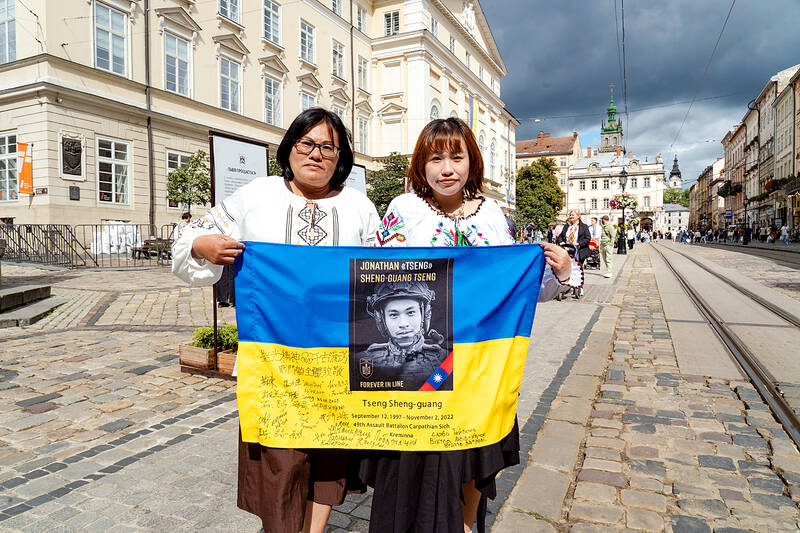Su Yu-jou (蘇雨柔), the mother of a Taiwanese soldier killed in Ukraine, described her journey of revisiting the war-torn nation and finding peace with her son’s death in an interview on Monday.
According to Su, she recently returned to Ukraine to handle details regarding condolence payment and to visit locals affected by the war after getting an invite from local volunteers.
"Although painful, I have finally gathered the courage to come back," she said.

Photo: CNA
Su’s first time in Ukraine was to attend her son Tseng Sheng-guang’s (曾聖光) funeral in Lviv on Nov. 15, 2022.
After Russia launched a full-scale invasion in February 2022, Tseng left his hometown of Hualien to join the country’s International Legion in June of that same year.
However, he was killed by Russian artillery in Lugansk, Ukraine, on Nov. 2, 2022, aged 25, becoming the first Taiwanese fatality in the conflict.
For over two years after Tseng’s death, Su said she was emotionally traumatized to the point where she would tell her family to turn off the television if Ukraine was on the news.
She also got three tattoos of her son to feel as if he was still with her every day, she said.
She said she found her peace when visiting the Lychakiv Cemetery, where other mothers and wives gather to mourn their loved ones lost in wars throughout Ukraine’s history.
Furthermore, she greeted amputated veterans on the street and talked with an old lady evacuated from Kherson, who has two sons-in-law fighting at the frontlines.
"Although we don’t know each other, we are all family here, since our children all sacrificed for Ukraine," she said.
After Tseng, several Taiwanese have joined Ukrainian forces to fight against Russia, including Wu Chung-ta (吳忠達), who also died in combat in 2024.
While she understands their quest for "justice," the thought of young people falling in the conflict still pains her, said Su.
Wearing Ukrainian traditional clothing, she said she considers her son Ukrainian as well, since he already gave up his life for the country.
"If there’s a chance, I’ll visit Ukraine again," she said.

A preclearance service to facilitate entry for people traveling to select airports in Japan would be available from Thursday next week to Feb. 25 at Taiwan Taoyuan International Airport, Taoyuan International Airport Corp (TIAC) said on Tuesday. The service was first made available to Taiwanese travelers throughout the winter vacation of 2024 and during the Lunar New Year holiday. In addition to flights to the Japanese cities of Hakodate, Asahikawa, Akita, Sendai, Niigata, Okayama, Takamatsu, Kumamoto and Kagoshima, the service would be available to travelers to Kobe and Oita. The service can be accessed by passengers of 15 flight routes operated by

Alain Robert, known as the "French Spider-Man," praised Alex Honnold as exceptionally well-prepared after the US climber completed a free solo ascent of Taipei 101 yesterday. Robert said Honnold's ascent of the 508m-tall skyscraper in just more than one-and-a-half hours without using safety ropes or equipment was a remarkable achievement. "This is my life," he said in an interview conducted in French, adding that he liked the feeling of being "on the edge of danger." The 63-year-old Frenchman climbed Taipei 101 using ropes in December 2004, taking about four hours to reach the top. On a one-to-10 scale of difficulty, Robert said Taipei 101

Taiwanese and US defense groups are collaborating to introduce deployable, semi-autonomous manufacturing systems for drones and components in a boost to the nation’s supply chain resilience. Taiwan’s G-Tech Optroelectronics Corp subsidiary GTOC and the US’ Aerkomm Inc on Friday announced an agreement with fellow US-based Firestorm Lab to adopt the latter’s xCell, a technology featuring 3D printers fitted in 6.1m container units. The systems enable aerial platforms and parts to be produced in high volumes from dispersed nodes capable of rapid redeployment, to minimize the risk of enemy strikes and to meet field requirements, they said. Firestorm chief technology officer Ian Muceus said

MORE FALL: An investigation into one of Xi’s key cronies, part of a broader ‘anti-corruption’ drive, indicates that he might have a deep distrust in the military, an expert said China’s latest military purge underscores systemic risks in its shift from collective leadership to sole rule under Chinese President Xi Jinping (習近平), and could disrupt its chain of command and military capabilities, a national security official said yesterday. If decisionmaking within the Chinese Communist Party has become “irrational” under one-man rule, the Taiwan Strait and the regional situation must be approached with extreme caution, given unforeseen risks, they added. The anonymous official made the remarks as China’s Central Military Commission Vice Chairman Zhang Youxia (張又俠) and Joint Staff Department Chief of Staff Liu Zhenli (劉振立) were reportedly being investigated for suspected “serious